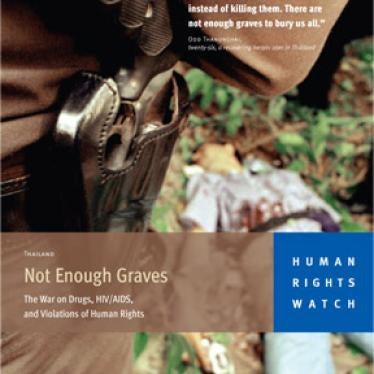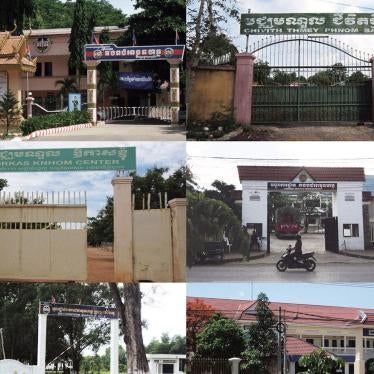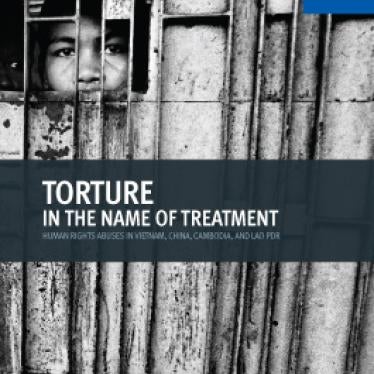(New York) - Thailand’s brutal anti-drug crackdown is jeopardizing its human rights record and its success against HIV/AIDS, Human Rights Watch said in a new report released ahead of the International AIDS Conference in Bangkok from July 11-16. A government anti-drug campaign resulting in as many as 3,000 killings has driven drug users underground and away from lifesaving HIV prevention services.
The 60-page report, “Not Enough Graves: Thailand’s War on Drugs, HIV/AIDS, and Violations of Human Rights,” provides fresh evidence of extrajudicial killings, arbitrary arrests and other human rights violations by Thai authorities. The report contains first-hand testimony from relatives of people killed during the drug war, as well as drug users who endured beatings, forced confessions and arbitrary arrests at the hands of Royal Thai Police.
“It’s a scandal that Thailand is hosting the International AIDS Conference while it persecutes people at high risk of HIV,” said Jonathan Cohen, researcher with Human Rights Watch’s HIV/AIDS Program and one of the report’s authors. “There are proven methods of addressing drug addiction and HIV/AIDS, and murder is not one of them.”
Although drug dealers are the stated targets of the war on drugs, drug users not charged with dealing have been persecuted and driven into hiding, which prevents them from reaching needle-exchange programs and other HIV-prevention services. Many injection-drug users face the risk of HIV infection from the sharing of blood-contaminated syringes.
In the past, health experts have praised Thailand’s leadership against AIDS since the country’s successful “100 percent condom” campaign in the 1990s. That program prevented an estimated 200,000 HIV infections by providing condoms and HIV/AIDS information in brothels and health clinics. But the war on drugs has reversed many of those gains.
“Thailand’s drug policy is tarnishing its reputation for HIV prevention,” said Cohen. “When it comes to preventing HIV among drug users, the country is a model of worst practices.”
On December 1, Prime Minister Thaksin Shinawatra declared “victory” in the war on drugs. In addition to almost 3,000 unexplained deaths, thousands had been forced into drug treatment in military-style boot camps. Surveys showed that many who enrolled in drug treatment were not even drug users, but people who feared arrest or murder if they did not participate in the program.
“Thailand’s ‘victory’ in the war on drugs makes a mockery of public health,” said Cohen. “Drug users should be offered humane and voluntary treatment, not targeted for death or arrest.”
The Thai government crackdown began in February 2003 for the official reason of curbing the trade in methamphetamine tablets, locally know as ya baa or “crazy pills.” Within three months, an estimated 2,275 drug suspects were shot dead. Scores of alleged drug dealers were placed on poorly prepared government “blacklists” and ordered to report to the police. Many were shot by unknown gunmen shortly after leaving the police station.
An estimated 100,000 to 250,000 people in Thailand inject heroin, even though methamphetamine pills have overtaken heroin as the country’s drug of choice. HIV prevalence among the country’s heroin users has stood at 40 percent or more since the late 1980s, in contrast to the declining rates among others at high risk. Drug users face limited treatment options and regular abuse by police, including beatings, false arrest and forced confessions. The Thai government continues to oppose needle-exchange programs, even though numerous scientific studies have proven that they reduce HIV transmission without increasing drug use.







